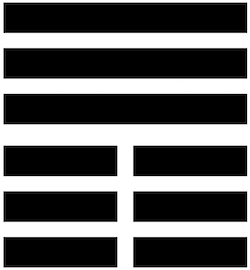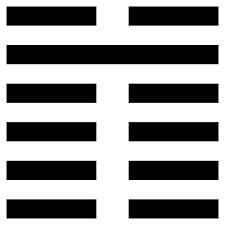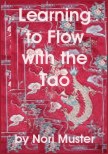
2024: A Pivotal Year Ahead
Advice from the I Ching
by Nori Muster
The Book of Changes, the ancient Daoist oracle I Ching, is still relevant today. Composed of sixty-four hexagrams, the six lines of each hexagram offer stories and metaphors to describe situations we may face in life. They also describe the best and worst attitudes to take.
I consulted the I Ching concentrating on the questions, "What is the best outcome for 2024 and what can people do to make it happen?" The I Ching answered with Hexagram 12, "The Strong Oppressing the Weak," Hexagram 21 "Biting Through," and Hexagram 8 "Groups."

Hexagram 12 - The Strong Trying to Obstruct the Weak
This hexagram reminds us we are fighting for equality for all. Unfortunately, we still have people ensconced in high positions in industry who may use their money to promote bias and discrimination. Cabals of oil barons continue to deny the harm their products cause for our Earth. In the coming year we will continue to witness climate problems and discrimination. However, America has always been the world's hope for peace, prosperity, and equality. These worthy goals have never been fully realized anywhere on our planet in recent history, but no other country has gotten as close to minority majority, with total equality, as America.
The I Ching comments: "When the strong demonstrate their inhumanity it creates an unbalanced situation." To explain the nature of the imbalance and why it happens, the first line, yin, shows someone pulling up clumps of grass in the yard. If this person is pulling weeds, great. If he's pulling up your rose bushes, not great. So things can go either way with the strong. History and current events remind us how painful it can be to watch tyrants torment innocent people.
The second line, yin, says a good leader fosters a sense of camaraderie in the workplace. This line shows a humble worker and says if the boss exploits this employee, the liability for any damage to the worker's life would be on the boss. We see exploitation all through society and wonder why so many people get away with it.
The third line, yin, shows a tyrannical leader who feels remorse and apologizes. The fourth line, yang, confirms how apologizing can restore harmony. However, the fifth line, yang, warns that tyrants may appear to change but can easily revert back to their negative habits. If they do, it makes life worse for everybody. Dishonest people usually don't change. They may tell themselves they've changed, or they may pretend to change. They may even feign contrition to manipulate people's sympathy.
The sixth line, yang, confirms it is possible for tyrants to go through a transformation and become better people. However, it takes years of introspection and amends. If a tyrant changes, then forgiveness and healing can begin. But as long as tyrants continue to abuse, there's no need to forgive them. Instead of trying to coddle the tyrant, to avoid hurting his or her feelings, we need to look to the future and act according to the law. Setting a precedent discourages future criminal behavior.
Prof. Timothy Snyder offers guidance in his book, On Tyranny, that supports Hexagram 12. Prof. Snyder encourages us to enrich our inner life so cruel people can no longer control us. He says instead of fear and isolation, we can promote trust. A friendly smile or a few friendly words for a stranger can provide reassurance to someone who may feel oppressed. Snyder says friendliness is a sign of a just and free society.

Hexagram 21 - Biting Through
This hexagram represents the level of persistence needed when trying to establish justice. To win a lawsuit, one party must pursue the other with tenacity. The subject of the first line, yang, is a defendant "with his feet inside tight socks." It says it feels like "the toes will never come out again." The time of judgment has arrived.
The remaining metaphors of Hexagram 21 are grotesque images that come with grave warnings. The subject of line two, yin, is a man who must resort to biting another man's nose to escape an assault. Further, the victim must bite until he bites through the attacker's nose. The metaphor of biting into flesh shows the violent, but necessary attitude to succeed in a heated situation. This may seem unsettling, but the I Ching confirms, because it was a dire situation the violence was necessary. The metaphor of biting through the assailant's nose shows us the pressure we are already starting to witness on behalf of justice as we live through this bridge in history.
The subject of the third line, yin, bites into flesh and finds it disagreeable. After an aggressive act in the name of justice, the subject of this line begins to wonder if there may have been an easier, nicer, or less aggressive way to solve things. The I Ching says, "There will be some regret, but the subject has not committed a great error."
The fourth line, yang, warns against procrastination, comparing it to "gnawing dried meat on a bone." The situation is dire and can only get worse. The message is to throw down the bone and get to work. The subject of the fifth line, yin, is "gnawing on dried flesh," and the message here again is to stop procrastinating and mete out consequences.
The grotesque metaphor of the sixth line, yang, shows exactly what procrastination begets. The subject of the sixth line is "bound by a slave's yoke." This is the final warning. The consequence for ignoring a tyrant's aggression is to allow ourselves to be enslaved.

Hexagram 8 - Groups
This hexagram puts the focus on the people and the power of coming together. In the first line, yin, it says if a group has good leadership, the members need to stand up for the leader, especially when opponents are spreading lies and propaganda. The fifth line, yang, goes into more detail about what makes a good leader. Qualified people are accountable for their actions and transparent about what they're doing. The story to illustrate this concept is a king who picks up a weapon to go hunting. Because he has made his intentions known to the citizens, nobody gets scared when they see him with a weapon. Everyone knows he's hunting for game. This is the opposite of having an unhinged screwball in charge, where you never know what might happen.
Lines three and four, both yin, take on the issue of how to manage dishonest people who try to infiltrate or exploit the group. A minority of dishonest people can dominate if they spread bias and discrimination. This negative behavior is one of the main factors dividing our society. I Ching recommends being polite, but wary. Spreading violent rhetoric is not a sign of good leadership, so we need an effective way to deal with people who test the limits of our patience.
The second line, yin, discusses the role of individual group members and says each person's inner harmony adds to the group's strength. Mature people with good boundaries and good intentions can build cohesive, productive groups that mirror their own sincerity. In a functional team, people have the ability to communicate and resolve problems as they arise. So one thing we can do to make next year better is to remain strong.
Line six, yin, elaborates on the purpose of an effective group. It says the real test of a group is not just how nice everyone is, but how much good work they get done. Working groups like boards and committees are part of the real world and should not break down into grade school playground fights. Acting like mature adults will add to our strength in 2024.
Notes
On Tyranny: Twenty Lessons from the Twentieth Century, by Timothy Snyder (The Crown Publishing Group, 2017)
This essay originally appeared in Sedona Journal of Emergence, Predictions 2024 & Beyond, Annual Predictions Issue 2023-2024.
Author's bio
Nori Muster is a freelance writer, artist, and adjunct professor at Mesa Community College. She has published several books including her memoir, Betrayal of the Spirit: My Life behind the Headlines of the Hare Krishna Movement (University of Illinois Press 1997). Her website is norimuster.com

The 64 Hexagrams of the I Ching: Learning to Flow with the Tao
The I Ching is the ancient Taoist book of metaphors, written to offer guidance in the inevitable changes of life. The I Ching consists of sixty-four hexagrams, the number of combinations mathematically possible with six solid and broken lines. The broken lines "- -" are yin, or passive, dark, yielding. The solid lines are yang, active, light, reaching. Ancient Taoist scholars recorded meanings for each of the sixty-four combinations.
Your future is in your hands. Consult the I Ching for ideas that lead to clear thinking and positive mental attitude. The I Ching teaches you to flow with changes. Create positive change from the inside through conscious living. Take the time to reflect on your attitudes and ideas.
This interpretation of the ancient text I Ching has been online since 2000. Thousands of visitors have accessed the oracle through Surrealist.org. Now it is available at Amazon. Learn to flow with change instead of resist it.
Learning to Flow with the Dao (paperback or e-book) at Amazon.com - click here
I Ching reading (free) at Surrealist.org - click here.
Index